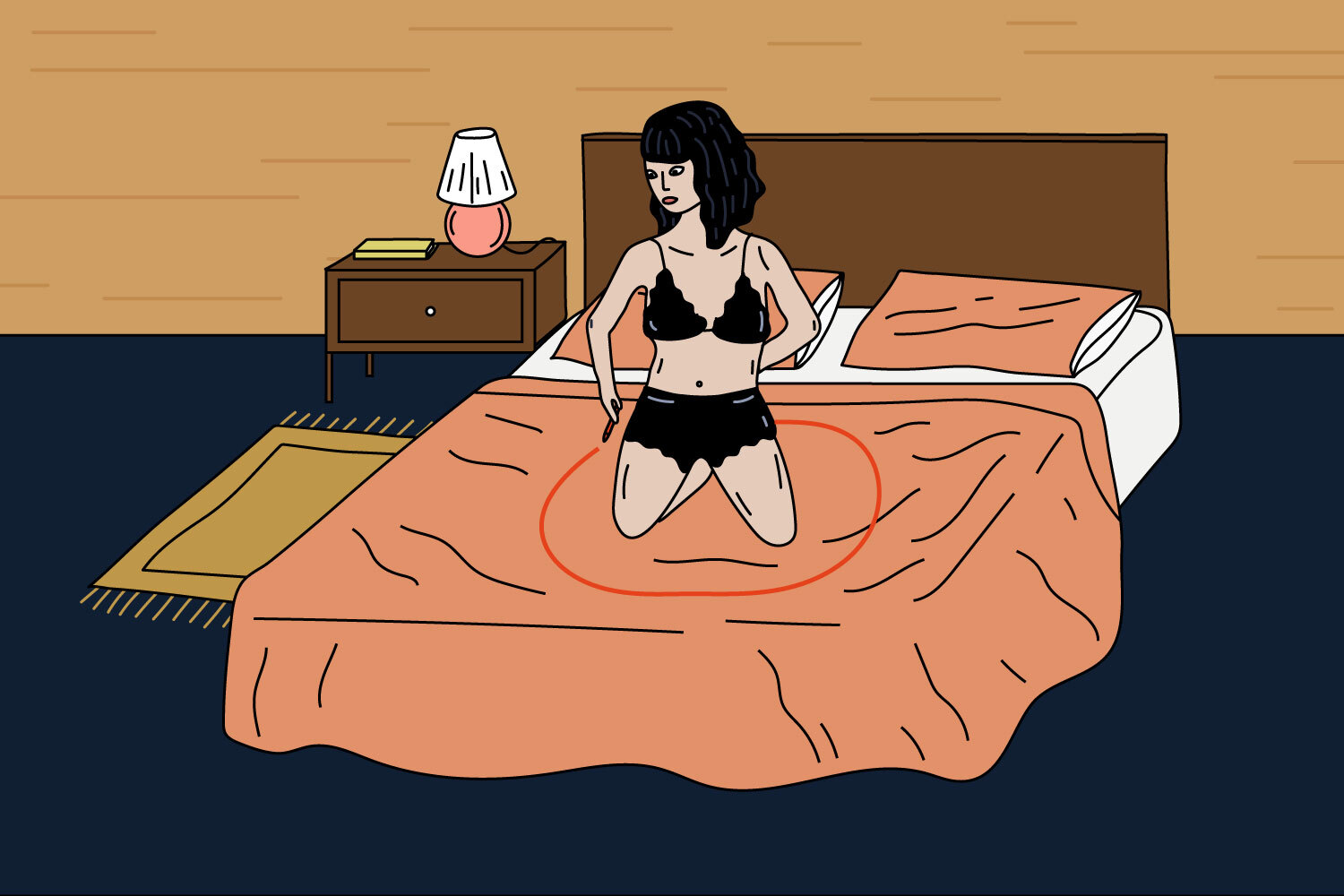Throughout history, we’ve been able to rely upon one unfortunate fact: someone, somewhere is showing his penis to someone else who doesn’t want to see it.
A global pandemic did not put an end to this universal truth. In fact, it pushed the natural limits of this phenomenon even further, spawning a new buzzword in the vocabulary of exposure and exhibitionism. Even as life increasingly happens offline again, “Zoom Dick” will still be with us.
But why did it arrive in the first place? Or, to put it more bluntly, what the hell are these men thinking?
Maybe it’s pure exhibitionistic perversion, guided solely by the thrill of wrongdoing. Maybe it’s both an accident and hubris — plenty of us have shirked normal work attire in the last year. Or maybe, as psychoanalysis and men with exhibitionistic tendencies speculate, it’s something else entirely.
“Zoom Dick,” as many publications have labeled it, refers most specifically to an October 2020 incident in which New Yorker reporter Jeffrey Toobin masturbated while in a work Zoom conference between fellow New Yorker members and WYNC employees. Then, in April 2021, it was, uh, revealed that The Believer editor-in-chief Joshua Wolf Shenk had stepped down following an incident in which he exposed himself to his colleagues while taking a Zoom meeting from his bathtub.
The intentions of those two parties aren’t exactly apparent or aligned. Toobin claims that he thought his camera was off, though the nature of his actions suggest he was indeed engaging in some sort of sexual act during a meeting regardless. Shenk’s story is that he was in the tub to help alleviate fibromyalgia pain — using one of Zoom’s digital background options to conceal his location — when his computer died. Believing he could not be seen, he got out of the bath to plug his computer in when, somehow, the camera captured the move.
Regardless of the circumstances and their validity, the reason we know of each of these cases is because they originate from media companies themselves. It’s plausible that similar situations have arisen at lesser known, smaller workplaces, just with less publicity. The countless tweets in defense of men like Toobin suggest evidence of that. Nevertheless, the reasoning as to why someone would expose themselves to their coworkers, therefore risking their jobs and livelihoods, remains confounding.

“It’s probably not a one-size-fits-all situation,” says Dr. Gail Saltz, Clinical Associate Professor of Psychiatry at the New York Presbyterian Hospital, Weill-Cornell Medical College and a psychoanalyst with the New York Psychoanalytic Institute. “But I also think that, psychologically speaking, yes, there are people who have a strong exhibitionistic and voyeuristic predilection.”
“That has been happening since there have been humans,” says Dr. Saltz. “That is not a new phenomenon. You know, decades and decades ago, we would call this a flasher or a peeping Tom. But obviously as time evolves, there are different ways to potentially watch or show, and whether one is conscious of that desire is another story.”
As Dr. Saltz argues, one possible explanation as to why someone — not necessarily Toobin or Shenk — would expose themselves on a work-related video call is that they’re not consciously aware of their exhibitionistic desires. Without working them out consciously and productively with, say, a consensual partner, these desires emerge in more destructive ways.
“One can be an exhibitionist and know that that is giving them sexual pleasure, and set out despite the fact that it’s a violation of somebody else,” she explains. “They are aware that it’s an invasion of somebody else’s space and consent. That’s part of what’s stimulating to them. And so there could be people who wish to do that, and are consciously aware of their wish to do that.”
Of course, many people are aware of their sexual desires but choose to either act on them in a consensual space or not act on them at all, knowing they ultimately do not wish to harm others. That is not a trait unique to flashers and their ilk.
“The problem is that when you are not consciously aware of that desire, you can do it without, in your mind, ‘meaning to,” says Dr. Saltz. In other words, many psychoanalysts would argue that it’s possible for repressed urges to lead to action without one being conscious of what they’re doing and why.
“When something is kept unconscious and unexplored, it actually has more power to motivate behavior. It’s sort of the tenant of psychoanalytic thinking or psychodynamic psychotherapy: the understanding that there are things that are conscious in our awareness and there’s things that are unconscious, not in our awareness.”
Sam*, 29, has explored his own exhibitionistic urges consciously online with sites like Omegle, an anonymous video-chat site that connects random users (see also: Chatroulette). As anyone who has used these sites knows, dicks abound, and Sam is one of the many people responsible for that.
“I would say that exposing my dick to strangers felt gratifying, but also a bit scary,” he says. “I was always a bit nervous about the reactions I would get, but it was also like experiencing a forbidden thrill. Usually we’re all so bound up by our clothes and propriety all the time, that exposing an intimate part openly feels liberating in a sense.”
Most commonly, he encountered other men who also had their dicks out. “I sadly never got a great interaction from it, but it was still fulfilling nonetheless,” he says.
He speculates that for men who show their genitals to others without their consent, exposing themselves delivers a sense of power. “I would venture to guess that some of these men have insecurities that they can somehow address by exposing themselves like this, as paradoxical as that sounds,” he says.
Alan*, 31, says he’s explored his exhibitonistic fantasies with a partner. For him, the goal is to not get caught, though the risk of it happening heightens the experience. “I have a pretty significant aversion to making people uncomfortable, so there’s a negative element where I try to structure the activities to avoid that,” he says. “That usually means either taking precautions to make sure I don’t actually get caught by the unwilling, or getting consent ahead of time from the folks who are actually watching.”
From his perspective, he’s unsure if Toobin or similar work-related exposures are actually related to exhibitionism.
“That specific case seemed a little odd to me, in a way that makes me think it maybe wasn’t an instance of intentional exhibitionism,” he says. “I actually have done my share of masturbating while on Zoom calls that I needed to be on but was not actively participating in, but it was a ‘camera off, porn in another window’ sort of thing that didn’t actually intersect with my exhibitionism. Though, I guess to contradict myself, I did get an under-the-table blowjob while giving a Zoom presentation once, and that was actually kind of hot in an exhibitionist sort of way.”
Considering how detrimental these incidents tend to be for people’s careers, Alan suspects many of these cases are simply people mishandling technology.
“My underlying suspicion is that a lot of the ‘Zoom dick’ incidents we hear about aren’t particularly tied to exhibitionist motivations,” he says. “These are generally going to be acts of planning rather than acts of opportunity, and exposing yourself to the editorial board at work is pretty poor planning. That guy who was in the bath and ‘accidentally got up’ [Shenk] is closer to what I would expect: like you maybe think you’ve got a ‘good excuse’ for it.”
In terms of the major cases we hear about, like that of Toobin or Shenk, we’ll probably never know the precise reasons why they occur. The men themselves may never know, either — at least according to the thinking of psychoanalysis.
“The mind has all types of defense mechanisms to deal with urges,” says Dr. Saltz. “Sometimes, they’re not good defense mechanisms — they are just denial of the urge, denial of the wish, and instead just behavior. If you’re not in touch with it at all, then it may just be something you do. Because it bypasses cognitive thought.”
Perhaps that is the best explanation we’ll ever arrive at to explain these behaviors. Exposing your genitals to a coworker defies all logic. Maybe the answer as to why someone would do something that appears to bypass cognitive thinking is simply that it actually did.
*Names have been changed for purposes of anonymity.
The Charge will help you move better, think clearer and stay in the game longer. Subscribe to our wellness newsletter today.


























